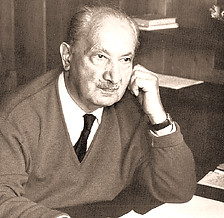
Congruent Field Theory
"Our self is not found in isolation, it is actualized in harmonious connection."
Congruent Field Theory views psychological distress as unrealized potential within interpersonal relationships. Focuses on creating congruent interpersonal fields that enable authentic presence, meaningful relationships, and actualization.
Congruent Field Theory (CFT) is a relational-ontological model positing that the self is not a pre-existing entity but is an "intersubjective self" that emerges from the quality of the interpersonal field. It proposes that our primary motivation is a "Congruence Drive" that compels us to co-create "Congruent Fields"—harmonious relational spaces defined by authenticity, resonance, and openness. Within these safe and embodied fields, our relational potential is "actualized" as this new, emergent self becomes integrated and real.

What is Congruent Field Theory?
Congruent Field Theory (CFT) is built on a foundational philosophy of Relational Ontology, which asserts that relations are ontologically prior to the individuals in relation. This model posits that a person is not a pre-formed, self-contained entity who then enters relationships, but rather that the self emerges from and is constituted by the relational field itself, shifting the traditional model from "individual → relationship" to "field → self." The theory holds that the primary human motivation is an innate "Congruence Drive," a fundamental need to establish and maintain "Congruent Fields"—which are harmonious interpersonal relationships defined by mutual authenticity, harmonic resonance, and receptive openness.
This Congruence Drive is the engine of human development, as it compels individuals to co-create the relational conditions necessary for growth. According to the theory's core mechanism, the establishment of a Congruent Field allows a novel, coherent "Intersubjective Self" to emerge. This emergence leads to Actualization, which is the developmental outcome where this new way of being becomes real, integrated, and available across contexts—representing the realization of relational potential rather than an individual's essence. This entire process is grounded in phenomenology and embodiment; the quality of the field is not an abstract idea but is felt in the lived body, with a Congruent Field registering as somatic ease, safety, and spaciousness, while an incongruent field manifests as tension and dysregulation.
Core Principles of CFT
Relational Ontology
Congruence Principle
Phenomenology
The Relational Ontology establishes the foundational claim of CFT: relations are ontologically prior to relata. This principle asserts that human beings do not exist as pre-formed, self-contained entities who subsequently enter into relationships; rather, the self is constituted through and emerges from the relational field itself. Drawing from process philosophy (Whitehead), dialogical thought (Buber, Bakhtin), and contemporary relational theories (Barad), this principle posits that to be is to be in relation.
The interpersonal field is not a context in which a pre-existing self operates, but the ontological ground from which the self arises. This inverts the traditional Western model: rather than individual → relationship, CFT proposes field → self. All subsequent principles of CFT rest upon this ontological foundation—the self is fundamentally and irreducibly an intersubjective phenomenon.
The Congruence Principle posits that human beings possess an innate Congruence Drive—a fundamental motivation to establish and maintain Congruent Fields (harmonious interpersonal relationships characterized by authenticity, resonance, and openness). Within these Congruent Fields, the Intersubjective Self can emerge as a coherent, integrated way of being, thereby actualizing the individual's inherent relational potential.
The Phenomenology provides CFT's methodological foundation and epistemological approach, specifying how the relational self is lived, accessed, and studied. Three phenomenological structures are essential:
-
Intentionality reveals that consciousness is always directed toward objects, meanings, and others within the field—the self never experiences itself in isolation but always as oriented-toward-world and oriented-toward-others. This establishes that awareness itself is fundamentally relational.
-
Intersubjectivity demonstrates that the lived experience of selfhood occurs through direct, pre-reflective engagement with other subjects; we do not infer other minds but encounter them immediately through shared meanings, emotional resonance, and co-created understanding. The field is experienced from within as a participatory reality, not observed from without as an object.
-
Embodiment grounds this entire process in the lived body (corps propre), showing that relationality is not abstract but somatically felt; the Congruent Field registers as bodily sensations of ease, flow, safety, and spaciousness, while incongruent fields manifest as tension, constriction, and dysregulation.
Together, these three phenomenological dimensions validate CFT's core claim: the self is not a hidden inner essence awaiting discovery but a lived, embodied, intersubjective process that emerges within and through the relational field. Phenomenology thus provides both the method for investigating this emergence and the evidence that it is the primary structure of human experience.

Major Contributors
Existential Holistic Therapy emerged from integrating existential phenomenology with dialogical and field approaches to human experience. The contributors below provided foundational insights that shaped our understanding of how authentic presence emerges through harmonious interpersonal relationships. Their work addresses core questions about meaning-making, relational being, field dynamics, and the conditions for psychological growth.
These contributors established that human experience cannot be understood through isolated individual processes alone. Husserl and Heidegger revealed how consciousness reaches toward the world through intentional acts within relational contexts. Buber demonstrated that authentic being emerges in the dialogic space between persons. Goldstein and Lewin showed that organisms function as integrated wholes within total field situations where person and environment mutually constitute each other. They showed that growth, congruence, and meaning arise through specific conditions - Congruent Field, that support the organism's inherent actualizing tendency. Together, they provide the foundation for understanding how harmonious interpersonal fields create the conditions for authentic presence and psychological actualization—the core principle of Congruent Field Theory and Existential Holistic Therapy.

Kurt Goldstein
-
Established organismic theory: the organism functions as integrated whole rather than separate parts
-
Developed concept of organismic self-regulation: inherent wisdom to regulate to environment
-
Showed actualization as fundamental biological drive toward realizing potential
-
Demonstrated holistic approach rejecting mind-body split and emphasizing total organism-environment interaction

Martin Buber
-
Created I-Thou relational philosophy: authentic encounter versus objectifying I-It stance
-
Established dialogue as fundamental human reality—"In the beginning is relation"
-
Developed concept of "the between": shared relational space where genuine meeting occurs
-
Showed how confirmation emerges through dialogic presence and inclusion

Kurt Lewin
-
Created field theory: behavior results from total situation (person plus environment)
-
Developed lifespace concept: person and psychological environment as inseparable constellation
-
Established that all field elements are interconnected and mutually influencing
-
Demonstrated contemporaneity principle: present field configuration determines current behavior

Alfred Adler
-
Founded Individual Psychology, viewing the person holistically.
-
Introduced the concept of the "inferiority complex" and the compensating "striving for superiority."
-
Believed that "social interest" (Gemeinschaftsgefühl) is the crucial measure of mental health.
-
Described the "style of life" as the unique way an individual pursues their goals.

Edmund Husserl
-
Developed intentionality framework: experience emerges through reaching out to the world and interpreting it
-
Established phenomenological method focusing on how things surface in awareness
-
Explored consciousness patterns and meaning-making processes
-
Emphasized experience-based knowledge through repeated consultation with lived reality

Viktor Frankl
-
Developed logotherapy, a therapy focused on finding meaning in life.
-
Freedom to choose attitudes and responses to life's challenges
-
Emphasized the "will to meaning" as the primary human motivation.
-
Advocated for "tragic optimism": finding meaning even in unavoidable suffering.
-
Posited self-transcendence (focusing on others) as key to mental health.

Martin Heidegger
-
Introduced Being-in-the-world (Dasein): existence as inseparably connected to world and others
-
Established authenticity as living with agency and responsibility versus defensive inauthenticity
-
Demonstrated that existence precedes essence—we are before we think
-
Showed how awareness and existence function intersubjectively

Carl Rogers
-
Developed congruence concept: harmony between inner experience and outward expression
-
Demonstrated that therapeutic relationship itself creates conditions for growth
-
Established actualizing tendency as directional force in human development
-
Showed how unconditional positive regard facilitates authentic self-emergence
Theoretical Foundations of Congruent Field Theory: An Interdisciplinary Integration
The theoretical foundations of Congruent Field Theory (CFT) are built upon a radical synthesis of Relational Ontology and Psychological Field Theory. Drawing from process philosophy (Whitehead) and dialogical thought (Buber), CFT's core premise is that relations are ontologically prior to the entities in relation; the interpersonal field is the primary reality, not a secondary context for pre-existing individuals. This philosophical stance finds its psychological application in the work of Kurt Lewin and Gestalt therapy, which CFT extends by positing the "interpersonal field" as the ontological ground from which the self arises. This framework directly inverts the traditional Western model, proposing that the self does not create relationships but is created by them.
CFT integrates this relational-field model with contemporary theories of Emergence to offer a new concept of the self. Rejecting the classic binary between a "true self" (Winnicott) and a "created self" (Sartre), CFT posits an "Emergent Self"—a novel, coherent, and authentic way of being that arises from the dynamic interactions within the field. This concept is strongly supported by an interdisciplinary consensus, including Complexity Science (emergence as a self-organizing principle), Dialogical Self Theory (Hermans' "society of mind"), and Interpersonal Neurobiology (Siegel's "emergent, relational mind"). The self is thus both genuinely "me" and genuinely new, its authenticity derived from the congruent quality of the field from which it emerges.
Finally, CFT provides a specific Embodied Mechanism for actualization, grounding its phenomenology in neurobiology. The "felt sense" of a "Congruent Field"—experienced as safety, resonance, and ease—is a direct correlate of a Ventral Vagal state of co-regulation (Porges' Polyvagal Theory). Within this embodied state of safety, CFT identifies two active ingredients: Validation (supported by DBT), which legitimizes subjective experience, and Admiration, the theory's unique contribution. This admiration is not praise but an ontological catalyst—a celebratory recognition of the emergent self's intrinsic value, which transforms it from a validated potential into an actualized, integrated reality.

Igor Light, LMHC
Founder and Developer and of Congruent Field Theory and Existential Holistic Therapy.
My work is based on a simple, powerful belief: we are shaped by our relationships. I don't believe that we are fixed, isolated individuals. Instead, I see our sense of self as something that emerges from the connections we share with others.
I developed Existential Holistic Therapy (EHT) from this idea. In my view, feeling "stuck," "fake," or anxious isn't a sign that something is wrong with you. It's a sign of "incongruent" relationships—connections that are out of harmony and don't give you the safety to be your full self.
My approach isn't to "fix" you. My goal is to co-create a genuinely "congruent" relationship with you, right here in our sessions—one built on real authenticity, understanding, and trust. In this safe, harmonious space, a more true and vital part of you can finally emerge. My job is to see that self, validate it, and genuinely celebrate it, helping it grow stronger and become a core part of who you are in the world.

